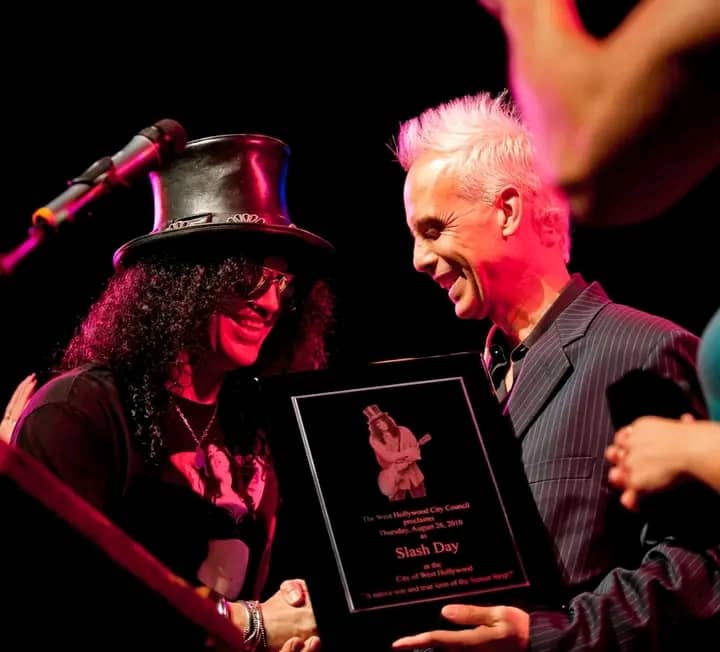Rock history isn’t built on quiet nights—it’s built on chaos, rebellion, and guitar riffs that shake the world. And on August 26, 2010, Los Angeles gave one of its loudest sons the ultimate crown jewel of recognition: “Slash Day.”
Yes, you read that right. The City of West Hollywood didn’t just tip its hat to Saul Hudson—the man the world knows simply as Slash—they locked his name into history with an official proclamation, turning the legendary Sunset Strip into his throne for a day. But what most people don’t know is just how deep this moment cut into rock culture, and why this one day was bigger than just another award, another tribute, or another plaque gathering dust on a wall.
This was the day a city officially bowed to the Top Hat King of Rock.
THE NIGHT THE STRIP BOWED TO A LEGEND
The Sunset Strip has always been more than a stretch of road. It’s the neon battlefield where rock ’n’ roll gods were made, where bands like The Doors, Mötley Crüe, and Guns N’ Roses turned debauchery into legend. So when West Hollywood stood up during the Sunset Strip Music Festival and proclaimed August 26 as “Slash Day,” it wasn’t just honoring one man—it was recharging the legacy of the Strip itself.
At the time, Slash had just dropped his self-titled debut solo album in April 2010. The record featured a jaw-dropping roster of guest stars—from Ozzy Osbourne to Fergie, proving that Slash wasn’t just surviving outside of Guns N’ Roses and Velvet Revolver—he was thriving. The city saw more than a guitar hero; they saw a cultural torchbearer who carried the raw fire of the Strip into the modern era.
And the crowd that night? They knew. Sunset Boulevard roared like it was 1987 all over again.
FROM GUNS TO GLORY: WHY SLASH GOT HIS OWN DAY
Let’s not sugarcoat it—this kind of honor doesn’t happen for just anyone strumming six strings. Slash Day wasn’t about a gimmick. It was about survival, legacy, and rebellion turned into art.
With Guns N’ Roses, Slash co-created some of the most iconic riffs in history—“Sweet Child o’ Mine,” “Welcome to the Jungle,” “Paradise City.” Songs that still pack stadiums today.
With Velvet Revolver, he proved lightning could strike twice, keeping rock radio alive in an era drowning in pop.
And now, with his solo career, he wasn’t just leaning on nostalgia—he was pushing forward, proving his guitar wasn’t a relic, but a weapon.
The City of West Hollywood knew the truth: the Sunset Strip wasn’t just a street—it was a shrine. And Slash was one of its high priests.
THE PROCLAMATION THAT SHOOK ROCK
The official city proclamation hit differently. It wasn’t some dusty government ceremony where a mayor drones on while everyone scrolls Instagram. This was a festival packed with sweat, beer, and screaming guitars.
City leaders literally stood before thousands of rock fans and declared: “August 26 shall forever be known as Slash Day in West Hollywood.”
Think about that. The same city where cops once tried to shut down rock clubs for being too wild was now bowing to one of the very icons who made that wildness immortal. It was more than ironic—it was justice served with distortion pedals.
SLASH SPEAKS: HIS HUMBLE REACTION
When Slash stepped up to accept the honor, he didn’t act like a king. He did what he always does—kept it cool, humble, and thankful. For a guy who helped define excess in the late ’80s, his 2010 self was grounded, focused, and fiercely dedicated to music.
Fans remember him tipping his iconic black top hat, sunglasses on, curly hair spilling everywhere, and thanking the Strip for shaping him into who he was. He made it clear: the Sunset Strip wasn’t just a stage—it was his training ground, his war zone, his cathedral.
And on that night, it became his kingdom.
WHY SLASH DAY STILL MATTERS TODAY
Fast-forward 15 years later, and the legacy of Slash Day still echoes. Cities hand out proclamations all the time—but how many of them actually mean something? This one does. Because Slash isn’t just a figure from the past—he’s still out there, shredding stages worldwide with Myles Kennedy & The Conspirators, and, of course, reunited with Guns N’ Roses for stadium-crushing tours.
The Sunset Strip itself has changed. Some clubs have closed, new faces have moved in, and the golden age of ’80s sleaze feels like a memory. But Slash Day keeps the flame alive. It’s a reminder that rock ’n’ roll’s DNA is built into that asphalt, those neon lights, and the ghosts of a thousand hangovers.
A CIVIC TRIBUTE TURNED CULTURAL LANDMARK
Most of us think of “days” named after celebrities as fluff—like a throwaway line on the news. But Slash Day wasn’t fluff. It was a cultural checkpoint. It was Los Angeles—the epicenter of Hollywood glitz—saying: “Rock is not dead. And neither is the Strip.”
For a city built on reinvention, honoring Slash meant preserving authenticity. Because if the Sunset Strip loses its rock roots, it loses everything.
THE FINAL RIFF
August 26, 2010, wasn’t just about Slash. It was about what he represents: survival, rebellion, and the enduring power of six strings and a Marshall amp. Slash Day was the night when Los Angeles admitted something we all knew deep down—this man isn’t just a guitarist. He’s a living landmark.
So next time you blast “Welcome to the Jungle,” remember this: there’s a day on the calendar when one of rock’s greatest warriors officially became part of civic history.
And in the city where dreams burn out fast, Slash proved his flame is eternal.


Leave a Reply